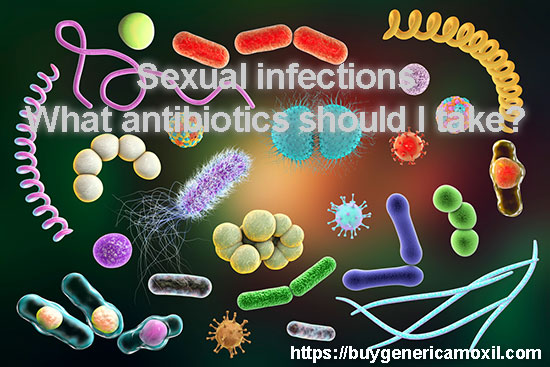In the treatment of sexual infections and sexually transmitted diseases, the main role is given to antibiotics. When inflammation, skin rashes, secretions are detected, broad-spectrum drugs are prescribed, and antiviral and antifungal agents act as “assistants”.
There are no replacement drugs for the treatment of STDs. Conditionally pathogenic and pathogenic bacteria – pale treponema, gonococci, gardnerella, chlamydia, ureaplasma and others – show sensitivity only to antibiotics.
For which STDs are antibiotics taken
Antibiotics are effective only against diseases caused by bacteria – gonorrhea, syphilis, chlamydia, trichomoniasis, venereal lymphogranulomatosis, AIDS. However, they are powerless against viruses, fungi or parasites.
The complexity of the selection of therapy lies in the difficulty of determining the pathogen. The occurrence of some sexually transmitted diseases, for example, Reiter’s disease, is associated with past infections – gonorrhea and chlamydia, but scientists have not yet been able to unequivocally determine whether they belong to a certain type.

Groups of antibiotics for sexual infections
When drawing up a treatment regimen for venereal diseases, it is customary to focus on the pharmacological properties of antibiotics. Only a few drugs can be called universal – these are the macrolides Erythromycin and Azithromycin. The rest affect only a specific pathogen or are taken in combination with other medications.
Penicillins: The basis of anti-syphilis therapy. Short-acting penicillin G is used all over the world as the most effective remedy at any stage of the disease.
Natural penicillins, such as Benzylpenicillin, have a short-term effect, are destroyed in the acidic environment of the stomach, so they are only available in the form of injections. To reduce the frequency of administration, synthetic antibiotics Ticarcillin, Amoxil, Carfecillin are used, which are characterized by higher biological activity.
Macrolides: They have practically no side effects, therefore, if it is impossible to use penicillins and other antibiotics, they are easily replaced. Suitable for the treatment of gonorrhea, syphilis, including those combined with chlamydia.
Erythromycin and Azithromycin are prescribed if antibiotic therapy after several courses has not yielded results.
Tetracyclines: Tetracycline, Doxycycline are highly toxic agents, but in some cases they are included in the treatment course for the destruction of bacteria of pale treponema and chlamydia. They are hard to tolerate – they cause allergies, provoke an increase in intracranial pressure, disruption of the gastrointestinal tract, so it is advisable to inject them intravenously.
Fluoroquinolones: Drugs Norfloxacin, Ofloxacin are better tolerated than tetracyclines, so they are included in the scheme for long-term treatment. Effective against gonococcal infection (gonorrhea), urogenital chlamydia. They are available in the form of tablets and injections.
Aminoglycosides: Spectinomycin, Neomycin have a bactericidal effect regardless of the phase of bacterial reproduction, so it is advisable to use them both in the absence of symptoms of the disease, and in severe forms, with suppressed immunity. Taken for gonorrhea: men – 1 time, women – 2 times (the dose is 2g).
Cephalosporins: They have a powerful bactericidal effect, similar to that given by penicillins. Despite the similarity of the mechanism of action on bacterial cells, new-generation drugs Cefpir, Ceftaroline are much more active, therefore, in venereology they are used to treat all forms of gonorrhea and syphilis.
Nitroimidazole derivatives: Metronidazole, Ornidazole is prescribed for trichomoniasis. Moderately toxic, available in the form of vaginal candles and tablets for oral administration. It is forbidden to drink alcoholic beverages during the treatment course.
Rules for the selection and administration of antibiotics for STDs
Self-medication for sexually transmitted diseases is strictly prohibited, since there are no universal schemes for taking antibiotics in medical practice.
The composition and frequency of the course is calculated by the doctor, focusing not only on laboratory research data, but even on the gender of patients. Unsystematic administration of drugs leads to the development of resistance (resistance) of bacteria, the transition of the disease into latent forms, provokes concomitant complications – the spread of infection to other organs (with damage to the skin, mucous membranes), disruption of the genitourinary system.
What pills to drink for the prevention of sexual infections
Without having laboratory data, an accurate diagnosis, it is not recommended to take antibiotics for the purpose of prevention. Preventive measures should be observed by people in contact with patients, but the selection of funds should be carried out together with the doctor.
Prevention is impractical if more than 3 months have passed since the moment of contact. To suppress the infection, a weekly course of injections of benzatin benzylpenicillin is usually prescribed.
Venereal diseases cannot be cured without adequate therapy. If you suspect an STD, we recommend that you consult with a specialized gynecologist, andrologist, venereologist and undergo a comprehensive examination.